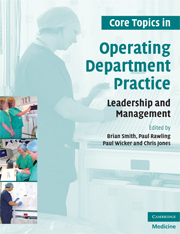Book contents
- Frontmatter
- Contents
- List of contributors
- Foreword
- Preface
- 1 Managing change in perioperative education
- 2 The role of the operating department manager within the context of the organization
- 3 Action learning: a new way of problem solving in perioperative settings
- 4 Agenda for change: what do theatre staff need to know?
- 5 The SWOT analysis: its place in strategic planning in a modern operating department
- 6 Corporate governance: setting the scene for perioperative practice
- 7 Managing different cultures: adversity and diversity in the perioperative environment
- 8 Leadership in perioperative settings: a practical guide
- 9 Management and leadership of advanced practice
- 10 Managing conflict in perioperative settings
- 11 The management and organization of emergency operating lists
- 12 Organizational culture
- 13 Development matters in the NHS; including a perioperative approach to the KSF
- 14 Equipment procurement: a purchaser's guide for theatre managers
- 15 The reflective practitioner in perioperative settings
- 16 New ways of working in perioperative practice
- 17 Damned if you do and damned if you don't: whistle blowing in perioperative practice
- 18 A manager's experience of recruitment and retention
- 19 The management of change
- Index
- References
18 - A manager's experience of recruitment and retention
- Frontmatter
- Contents
- List of contributors
- Foreword
- Preface
- 1 Managing change in perioperative education
- 2 The role of the operating department manager within the context of the organization
- 3 Action learning: a new way of problem solving in perioperative settings
- 4 Agenda for change: what do theatre staff need to know?
- 5 The SWOT analysis: its place in strategic planning in a modern operating department
- 6 Corporate governance: setting the scene for perioperative practice
- 7 Managing different cultures: adversity and diversity in the perioperative environment
- 8 Leadership in perioperative settings: a practical guide
- 9 Management and leadership of advanced practice
- 10 Managing conflict in perioperative settings
- 11 The management and organization of emergency operating lists
- 12 Organizational culture
- 13 Development matters in the NHS; including a perioperative approach to the KSF
- 14 Equipment procurement: a purchaser's guide for theatre managers
- 15 The reflective practitioner in perioperative settings
- 16 New ways of working in perioperative practice
- 17 Damned if you do and damned if you don't: whistle blowing in perioperative practice
- 18 A manager's experience of recruitment and retention
- 19 The management of change
- Index
- References
Summary
Key Learning Points
Understand the role of a manager in staff recruitment
Identify the tasks involved with developing a recruitment strategy
Understand interviewing of candidates
Understand introducing new staff to the department
Appreciate how to improve staff retention
The author was an operating department manager for many years and the chapter discusses some of the factors that this author found to be important while working in this position. Recruitment and retention is becoming increasingly important as the number of school leavers falls and the challenges for the NHS to increase its effectiveness and efficiency rise ever higher. Furthermore, many experienced managers left the NHS following service cutbacks that occurred in the first years of the twenty-first century. This chapter, therefore, offers a manager's eye view of the issues surrounding recruitment, interviewing, selection and retention of staff and how these can be addressed.
The modern operating theatre if it is to function properly relies on the manager to facilitate the needs of its staff, in terms of theatre personnel, equipment, appropriate training and a safe working environment. This chapter will concentrate on the human resource element, discussing the principles and management of staff recruitment, staff retention and sickness absence.
Prior to the start of a new financial year, a manager will need to assess the theatre's workforce strategy for the coming year. This is achieved by ascertaining who is currently in post, what vacancies exist and what staff numbers and skill mix is required to achieve the theatre's goals (Department of Health 2004).
- Type
- Chapter
- Information
- Core Topics in Operating Department PracticeLeadership and Management, pp. 153 - 158Publisher: Cambridge University PressPrint publication year: 2009

